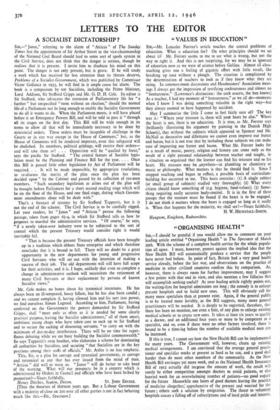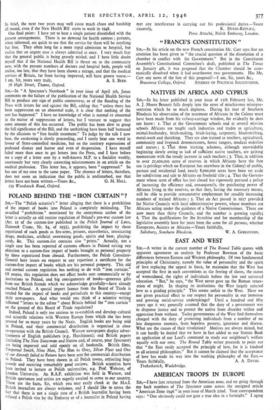" ORGANISING HEALTH" should be grateful if you would allow me
to comment on your leading article entitled " Organising Health " in The Spectator of March 29th. With the scheme of a complete health service for the whole popula- tion all agree. I must, however, protest against the implied idea that the New Health Bill will automatically produce a service that the people have never had before. In point of fact, Britain had a very good health service already, before the last war, and observations on the practice of medicine in other civilised countries confirm this by comparison. As, however, there is always room for further improvement, may I suggest a few points with that end in view, and also mention a few fallacies that will accomplish nothing useful? As your leading article rightly points out, the waiting-lists for hospital admissions are long ; the remedy is to enlarge present hospitals and to build new ones. This will obviously call for many more specialists than at present exist. Again, if the general public is to be treated more lavishly, as the Bill suggests, many more general practitioners will be needed. It is deeply to be regretted, therefore, that there has been no mention, not even a hint, of any plan to enlarge existing medical schools or to create new ones. It takes at least six years to qualify as a doctor, and an additional four years or more to be competent as a specialist, and so, even if there were no other factors involved, there is bound to be a time-lag before the number of available medical men can be increased.
If this is true, I cannot see how the New Health Bill can be implemented for many years. The Government will, however, churn up existing medical arrangements. I am convinced that the average general practi- tioner and specialist works at present as hard as he can, and a good deal harder than do most other members of the community. As the New Health Bill envisages yet more work, and as the National Health Insurance Bill of 1912 actually did increase the amount of work, the result will surely be either competition amongst doctors to avoid patients, or else
hurried work for an overwhelming number of patients—no good augury for the future Meanwhile one hears of good doctors leaving the practice of medicine altogether; apprehensive of the present and worried for the future ; others seek a solution by emigration. The threat to voluntary hospitals causes a falling off of subscriptions and of local pride and interest. In brief, the next two years may well cause much chaos and hardship all round, even if the New Health Bill starts to work in 1948.
One final point: I have yet to hear a single patient dissatisfied with the present arrangements. There is no demand for health centres ; patients, when informed, are quick to see that the service for them will be anything but free. They often long for a more rapid admission to hospital, but realise that an urgent case is always admitted at once. I very much fear that the general public is being gravely misled, and I have little doubt myself that if the National Health Bill is thrust on to the community now, with the present numbers of doctors and hospital beds, people will realise, too late, that they have been shown a mirage, and that the medical services of Britain, far from having improved, will have grown worse.-



























 Previous page
Previous page